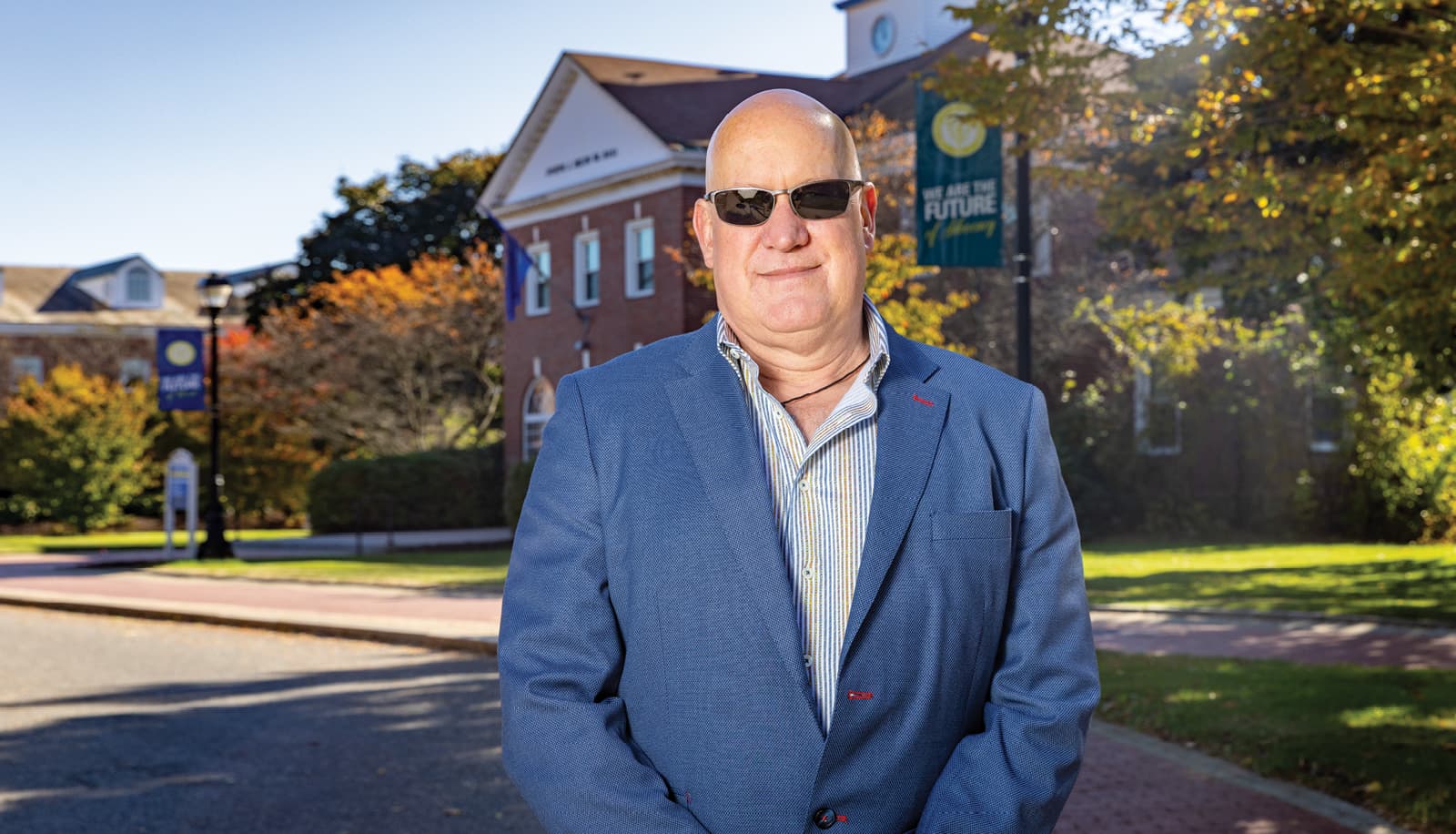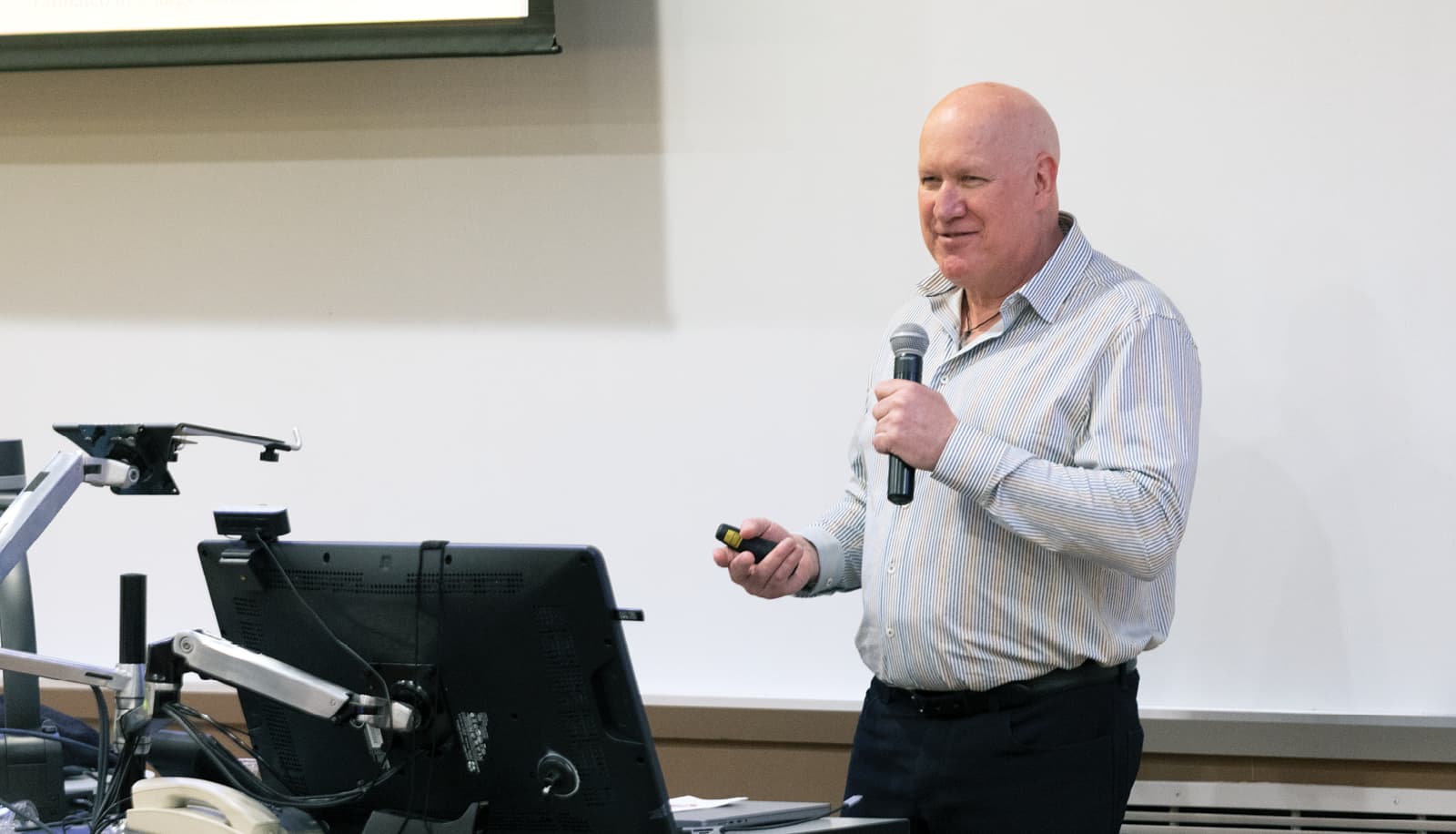
From Western New England to the Frontlines of Cancer Research
Dr. Colin Collins' Journey of Discovery
By Jason Seacat
For Dr. Colin Collins ’82, the path to becoming a globally recognized leader in cancer research was not always a straight line. It was not meticulously planned, nor did it follow a predetermined script. Instead, his journey was fueled by curiosity, resilience, and an unshakable belief in the power of mentorship and persistence.
Collins did not arrive at Western New England University (WNE) with a clear vision of his future. In fact, he had not initially planned to go to college at all. He intended to take a year off after high school, but after seeing friends embark on their university journeys while he worked in a factory and at a gas station, he decided to apply initially as a business major. However, one visit to a biology lab on campus changed everything. During this visit, he tapped into his childhood fascination with science and knew immediately that biology, not business, was his true calling.
During his time at WNE, Collins found more than just a major; he discovered an academic community that would profoundly shape his future. Living on campus exposed him to students from diverse backgrounds, opening his eyes to new perspectives and possibilities. Within the Department of Biology, he found a mentor in Dr. Robert Holdsworth, who inspired him to think critically and approach science with curiosity. Dr. Earl Chapman in the Department of Chemistry helped him sharpen his skills in chemistry, an area he would later rely on heavily in his research. Philosophy courses with Dr. Emmett Barcalow expanded his intellectual horizons, fostering independence in his thinking. Each of these experiences laid a foundation that would propel him forward in his career.
After graduation, Collins set his sights on California, determined to break into the emerging field of genetic engineering. At the time, only a handful of companies worldwide were engaged in the work he aspired to do. What he had not anticipated was the level of competition he found himself up against, with graduates from Stanford, Berkeley, and other elite institutions. Unable to land a job in this field right away, he worked in restaurants to make ends meet—refusing to be deterred.
A turning point came when he sought to enroll in San Francisco State University’s newly established genetic engineering program; the first of its kind in the world. However, Collins was first told his undergraduate grades were not strong enough to gain admission to the program. Instead of accepting rejection, he convinced Dr. John Stubbs to let him audit courses. Dr. Stubbs made him a deal: if he earned straight A’s, he would be allowed to enroll. True to form, Collins not only met, but exceeded expectations, earning a near-perfect 3.97 GPA. Under the guidance of Dr. Frank Bayliss, he learned genetic engineering and secured a summer internship at Genentech, which led to a full-time position at the prestigious Lawrence Livermore National Laboratory. It was there, surrounded by some of the most brilliant scientific minds in the world, that he realized he wanted to do more than conduct experiments at the bench; he wanted to lead scientific discovery. That realization led him to pursue a Ph.D. at the University of British Columbia (UBC), a decision that would define the rest of his career.

Today, Dr. Collins is a tenured professor at UBC and a leader in translational cancer genomics. His groundbreaking research has reshaped our understanding of tumor progression and resistance to therapy, leading to advances in precision oncology. While at the University of California, San Francisco, he was the first to recognize the importance of amplifications and deletions in genetic sequences as predictors of prostate cancer metastasis, an idea initially dismissed by many of his peers as irrelevant “noise.” Next, he pioneered the development of paired-end sequencing, a method that revolutionized genome sequencing. At UBC, he has been at the forefront of the application of liquid biopsies for monitoring prostate cancer progression and drug response from noninvasive blood draws.
Despite his many achievements, Collins remains keenly aware of the challenges that come with pushing the boundaries of science. Even now, as he explores new frontiers in artificial intelligence (AI)-driven cancer detection and personalized medicine, he encounters skepticism from those who doubt unconventional approaches. His advice to aspiring scientists? “If you really believe you are right, and it is based on solid evidence, pursue it doggedly. If you are doing something original, there will always be doubters. Persist.”
Looking ahead, Dr. Collins sees AI playing an increasingly vital role in cancer research. Currently, scientists can generate vast amounts of data but analyzing that data remains a challenge. AI will be a game-changer, helping researchers process complex datasets to develop better diagnostic tools and personalized treatments.
“If you really believe you are right, and it is based on solid evidence, pursue it doggedly. If you are doing something original, there will always be doubters. Persist.” - Dr. Colin Collins ’82
For students embarking on their own journeys, Collins’ message is clear: “Find really good mentors and listen to them. Find people who believe in you and take their advice seriously. If you want to be at the top of your field, you need mentors who will push you, challenge you, and support you.”
Dr. Colin Collins’ journey from a first-year biology student at Western New England University to a leader in cancer genomics is a testament to the power of mentorship, perseverance, and following one’s passion. His path was not always linear, but his determination to push boundaries and challenge conventional thinking has led to breakthroughs that have reshaped the way scientists approach cancer research. His story is an inspiration to students and professionals alike, proving that with the right guidance and an unwavering commitment to one’s vision, extraordinary achievements are possible.


